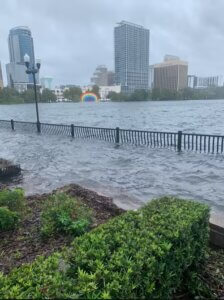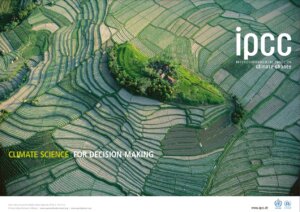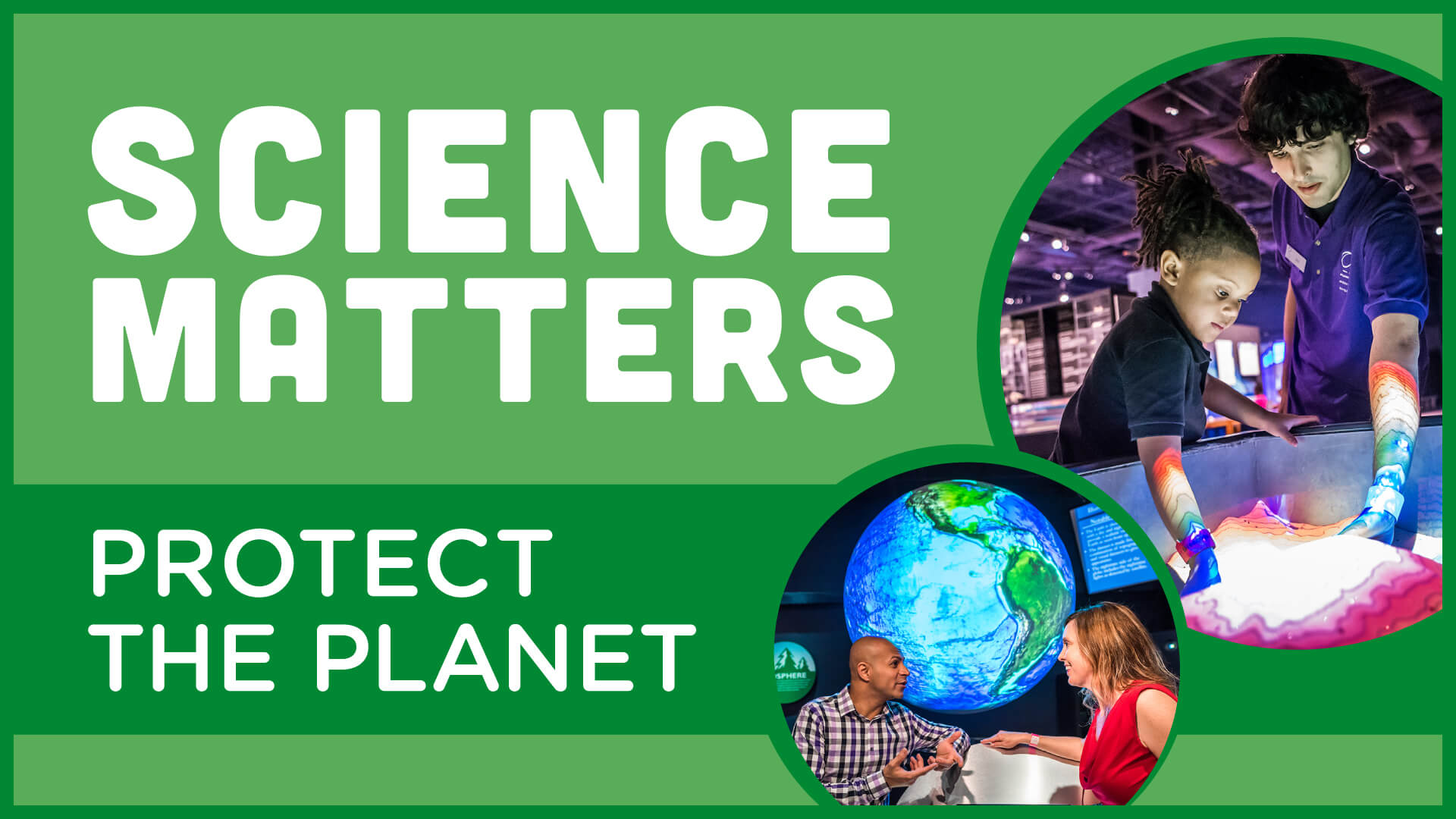An Eye on the Horizon
Orlando Science Center is dedicated to helping break down fears surrounding intimidating topics in order to encourage more curiosity, innovation, and discussion. We want to strengthen people’s skills in the scientific method so they can apply critical thinking skills to make informed decisions regarding science topics.
So, what is a major issue we face every day that might seem intimidating? Climate change. Building critical thinking skills and science literacy will help us better understand complex interactions and connections between us, our planet, and our ecosystems.
Questions to Consider
By the end of this page, you should be able to answer the following questions:
What is climate change?
How does climate change affect my life?
What can I do to help make a difference?
Global Warning
Take hurricanes, for example. Are they caused by climate change? No, but they are affected by it. For instance, Hurricane Ian was one of the most devastating and destructive storms Florida has ever endured. One of the top five strongest storms ever to make landfall here, Ian was the deadliest hurricane to strike us in nearly 100 years.
Many factors contributed to Hurricane Ian, so, alone, the storm can’t tell us much. But when we compare data from Ian to data from other major storms throughout history, a pattern becomes clear.
“You need to look at trends,” states Kim Prather, Distinguished Chair in Atmospheric Chemistry at University of California, San Diego. “And there is definitely an increase in the number of major weather-related disasters occurring over recent decades.”
Experts agree that while climate change cannot be credited with causing one storm, the historical changes in surface temperatures, sea level, and rainfall clearly indicate that climate change contributes directly to the strength and size of a storm.
Andrew Dessler is the director of Texas Center for Climate Studies and professor of atmospheric sciences at Texas A&M. While discussing Hurricane Ian, Dessler said, “We are 100% sure that the storm surge was more damaging because it was riding on a higher sea level. We are very confident that global warming is also causing more rainfall from hurricanes because warmer air holds more water.”
The Intergovernmental Panel on Climate Change (IPCC) provides regular assessments of the scientific basis of climate change, its impacts and future risks, and options for ways to make a positive impact. In its most recent Synthesized Report (2014), the IPCC stated clearly, “Warming of the climate system is unequivocal.”
So, what can we do? Well, that’s what we’re here to discover – together!
Why Are We Talking About This?
The Science Matters program at Orlando Science Center is about building critical thinking skills and encouraging discussion and science literacy regarding important science topics in the news.
With this campaign, we hope to provide tools for you to help you gain a better understanding of the impact of climate change on your life. We will identify resources to help break down what climate change means and inspire us to make a positive impact.
An Introduction to Climate Change
Our understanding of climate change has gone through several changes over the last few decades. For a while, debate centered on whether global warming existed at all. Later, the debate evolved into an either/or situation: are humans impacting the climate, or is this change entirely natural?
 It is very clear that humans are changing the atmosphere through greenhouse gas emissions and deforestation, which is leading to a warmer average temperature and changes in climate and ecosystems around the globe.
It is very clear that humans are changing the atmosphere through greenhouse gas emissions and deforestation, which is leading to a warmer average temperature and changes in climate and ecosystems around the globe.
The Intergovernmental Panel on Climate Change (IPCC) is a collection of people around the world who have dedicated their entire lives to the research of climate change. They’ve created detailed reports that prove these claims.
If you’d like to do your own research, you can read through these reports on the IPCC Website. The reports are a great source, and the IPCC provides more approachable summaries on their site that do a good job of breaking down the complex science.
However, if you’re looking for something more digestible, you’re in luck! There are many reliable sources across the internet. If you need help figuring out whether a source is reliable or not, check out our blog on Mythbusting Misinformation. We’ve shared some of our favorite resources on climate change below.
Understanding Our Impact
Before we dive into solving the world’s problems, it’s important to understand how our actions impact our planet. For example, a carbon footprint is a measure of how much our daily activities – such as using energy, driving a car, or disposing of waste – cause greenhouse gas emissions. This Carbon Footprint Calculator estimates your footprint in three areas: home energy, transportation, and waste. Everyone’s carbon footprint is different - try out the calculator now to see what your footprint looks like!
Plus, here are some great videos to help you understand how individuals, organizations, and countries contribute to climate change and what they’re doing now to make a positive impact.
What is Climate Change?
From Crash Course, this video is a great introduction to the main driving forces of climate change and how individuals and organizations are contributing.
Who is Responsible for Climate Change?
From a series supported by Breakthrough Energy - a coalition formed by Bill Gates to expand clean-energy investment - this video shows how countries and politics play into climate change.
Have We Made Any Progress on Climate Change?
From PBS Terra, explore where we've been in our race against the clock, where we're going, and how greenhouse emission projections can help us understand this story - as well as our future on this planet.
What's the Deepest Storm Surge in History?
Hurricane Ian brought 15 feet of storm surge into Ft. Myers when it made landfall. From PBS Terra, this video explores the causes of storm surge - the most dangerous part of a hurricane - and why it matters.
Join the Planetary Defenders! An Eye on the Horizon
The good news about climate change is that it is NOT an all-or-nothing outcome. There are a million different possibilities with varying degrees of impact, and the more we do to slow down the change, the more we can minimize harm. This truly means that every little bit helps – and there are hundreds of ways to make a positive difference!
Everything from turning off lights to advocating for policy change that supports meaningful action can make an impact. One of the biggest ways you can make a difference is to simply be curious. Educate yourself and remember that there is always more to learn, no matter your background or education level.
Here are some resources to get you started in your role as a Planetary Defender:
- Get involved with organizations and programs like Inspector Planet! On a mission to extend humanity’s time on Earth, the Inspector Planet team works to sustain the natural resources we need to survive through investigation, innovation, and information. You can help the team by reporting environmentally unusual observations, helping to collect data, or signing up for citizen/community science programs.
- For the Grown-Ups: Many utility providers in different cities and municipalities offer rebates for making energy-saving changes around your home. For example, OUC offers a number of different rebates for both residential and commercial properties! Check with your utility provider to see if you might be eligible for any of these programs.
- Try your hand at composting! Composting is the process of turning kitchen and yard waste into usable, nutrient-rich soil through natural decomposition. The Science Center composts food waste from our café, and it's much more approachable than you may think. Single family residents in the City of Orlando can request a free backyard composter, and our friends at O-Town Compost have community composting down to a science. Check them out and learn from the best!
How to Talk to Your Kids About Climate Change
Caregivers, you know your child best. That’s why you’re in the best position to talk to your kids about climate change! Each of these articles offers suggestions and perspectives for preparing for and facilitating successful and supportive conversations about climate change with kids of all ages – from young children to teens. While these are arranged by most appropriate age from youngest to oldest, each of these resources has something to be learned for all ages.
Resources Created for Children
Resources Created for Caregivers
Did your child have questions about climate change following your conversation? Are they feeling a strong need to help and take action? These resources provide specific tips for children and families to conserve resources and reduce their impact. They’d be a great follow-up resource to conversations about protecting the planet.
Be sure to check in at the KidsTown Studio for a copy of our Science Matters/Climate Change Children’s Book List. The list will also be available on the OSC app! These books offer age-appropriate introductions (covering ages 3-12) to what’s happening and how children and families can help!
Walking the Walk at Orlando Science Center
At Orlando Science Center, it’s important to us that we pair online resources like this with on-site activities that help reinforce these concepts. That’s why we have a couple of activities planned – both scheduled shows and pop-up activities – that can help you get hands-on with climate change as a concept!
Every day at 4:00 pm, we run a live show on the Discovery Stage in Our Planet to help visitors understand the basics of climate change. The show includes simple demonstrations to help you better understand climate change, as well as a few hands-on activities to show just how difficult it can be to agree on how to tackle complex issues like this. You’ll learn more about the concept of carbon neutrality and explore the simple science around how our planet is warming.
Plus, we’ll be debuting a large pop-up activity in the rotunda, where guests will be challenged to demonstrate the carbon cycle with just buckets and ping pong balls! Explore how carbon levels balance (or unbalance!) as visitors redistribute themselves around the board, serving as symbols of volcanoes and trees, which emit and absorb carbon, respectively.
We’ve also created a number of programs in KidsTown specifically for our visitors aged 7 and below. These resources include a special KidsTown Studio bookshelf, guest StoryTime readers like local meteorologists, and family-friendly resource sheets with tips on talking about and addressing climate change together, we have programming for all ages!
In addition to our hands-on approach to learning, we also believe in doing our part to combat climate change. Have you ever wondered what happens to the aeroponic plants we grow outside the 4Roots Café? They become food for some of our animal ambassadors! We also use old shredded documents to provide enrichment and comfort in their enclosures. These are just a few ways we are working to do our part and make a positive impact.
Hope for Tomorrow
Like we said earlier, climate change is not an all-or-nothing issue. There is work to be done, and we can ALL help! Science begins with good communication, so help us spread the word. Talk to people in your life who might not be thinking about this! Here’s a list of conversation starters, in case you’re not sure where to begin. You can also check out this video, The Secret to Talking about Climate Change, presented by Action for the Climate Emergency.
Conversation Starters:
- Does our neighborhood recycle?
- What are the most impactful things we do to protect the environment? What are the most harmful and what can we do about that?
- Have you ever noticed changes in your local environment? How do these changes affect the plants and animals that live there?
- What are common sources of air pollution that you see every day? What can you do to help reduce air pollution? Can you carpool, walk, or bike more instead of driving?
- What are the things that you do that use the most water? How can you reduce the amount of water you use? Can you fix leaks and take shorter showers?
- How can you get involved in environmental initiatives in your community? Can you join a conservation group or participate in a local cleanup effort?
- Do you know how your food gets from the farm to your table? Can you think of ways to reduce the distance it travels?
- How can you reduce the amount of waste you produce? Can you recycle or compost more?
- What is your favorite outdoor place? Why do you like it? How can you help protect it?
- What do you do every day to conserve resources? Can you think of new ways to save energy and water?
- What are some of your favorite products, and how are they made? Can you think of alternatives that are better for the environment?
- What are some of the dangers facing wildlife and their habitats? Can you think of ways to help protect them?
- How much food waste is created in your house every week? What can you do to reduce that number?
We WILL fix climate change! If you’re feeling overwhelmed by all of this doom-and-gloom, don’t worry – you’re not alone. But humanity is not doomed. There is hope for tomorrow! All you have to do is take things one step at a time. In the meantime, check out these 22 inventions that show how science and innovation are helping to make a real difference in climate-related efforts around the world.
